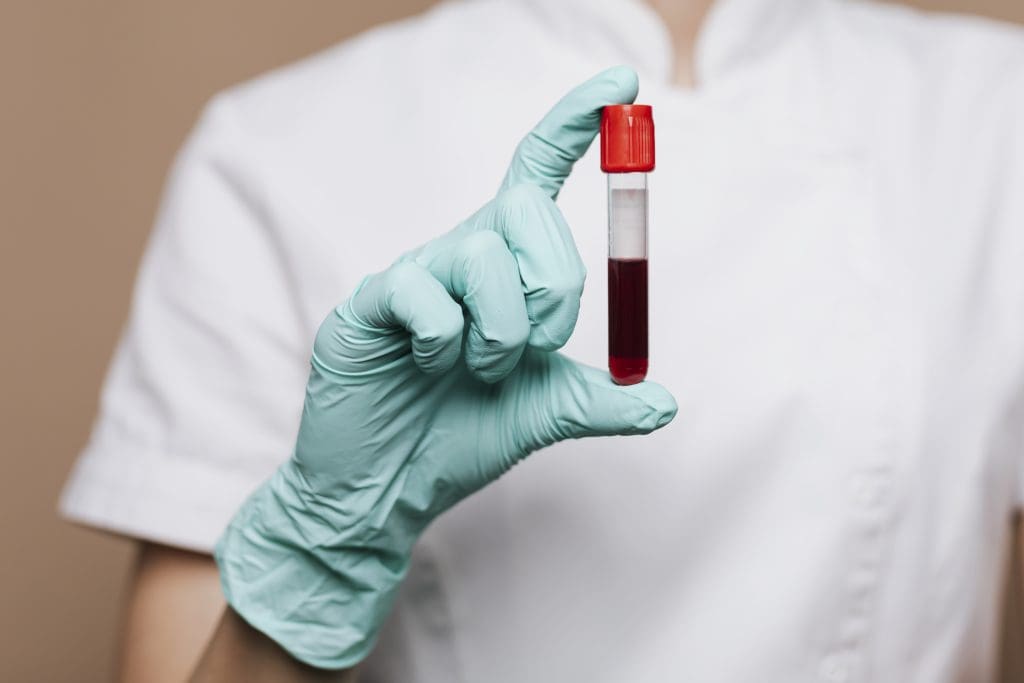Thalassemia is a genetic disorder that affects how the body makes hemoglobin. This leads to anemia and other health issues. About 1 in 100,000 people worldwide are born with this condition. It’s a big health problem globally.
Vitamin B12 is key for making red blood cells. Not having enough can make anemia worse. Should I take B12 if I have thalassemia? We’ll look into if thalassemia patients should take vitamin B12 supplements to better manage their condition.

Key Takeaways
- Thalassemia patients often experience anemia due to impaired hemoglobin production.
- Vitamin B12 is essential for red blood cell production.
- Deficiency in vitamin B12 can worsen anemia in thalassemia patients.
- Taking vitamin B12 supplements may help manage thalassemia-related complications.
- Consulting a healthcare professional is necessary before starting any supplements.
Understanding Thalassemia and Its Impact on the Body
thalassemia impact on red blood cell production
Thalassemia is a genetic disorder that affects how red blood cells carry oxygen. It leads to anemia, fatigue, and other issues. This is because the body can’t make enough hemoglobin.
Thalassemia is passed down in an autosomal recessive pattern. This means a person needs two defective genes to have the condition. The severity depends on how many genes are affected and the type of mutation.
How Thalassemia Affects Red Blood Cell Production
Thalassemia impairs the production of hemoglobin. This makes red blood cells fragile or scarce. As a result, the body doesn’t get enough oxygen to tissues and organs.
Looking at alpha-thalassemia and beta-thalassemia helps understand the impact. Alpha-thalassemia affects alpha-globin chains, while beta-thalassemia affects beta-globin chains.
| Type of Thalassemia | Effect on Globin Chains | Impact on Red Blood Cells |
| Alpha-Thalassemia | Reduced production of alpha-globin chains | Variable severity, from mild anemia to severe red blood cell deficiency |
| Beta-Thalassemia | Reduced or absent production of beta-globin chains | Ranges from mild (beta-thalassemia minor) to severe (beta-thalassemia major) |
Knowing how thalassemia affects red blood cells is key to managing it. It guides treatment plans like blood transfusions and iron chelation therapy. Sometimes, bone marrow transplantation is considered.
The Relationship Between Thalassemia and Vitamin Deficiencies
It’s important to know how thalassemia and nutritional deficiencies are connected. This knowledge helps in managing the condition better. It also improves the quality of life for those affected.
Thalassemia is a genetic disorder that affects how the body makes hemoglobin. This can lead to health problems, including nutritional deficiencies. Nutritional deficiencies in thalassemia patients can arise from impaired absorption, increased requirements, and the effects of treatment.
Common Nutritional Deficiencies in Thalassemia Patients
Thalassemia patients often face nutritional deficiencies. These include a lack of vitamins and minerals. Some common deficiencies are:
- Vitamin B12 deficiency, which can affect the production of red blood cells and lead to anemia.
- Folate deficiency, which is key for preventing anemia and ensuring proper red blood cell production.
- Vitamin D deficiency, important for bone health, which is a concern for those receiving frequent blood transfusions.
A leading researcher noted,
“Nutritional deficiencies are a significant concern in thalassemia patients, and addressing these deficiencies is critical for overall health.”
Why Vitamin Deficiencies Occur in Thalassemia
Vitamin deficiencies in thalassemia happen for several reasons. These include impaired absorption and increased needs. The condition and its treatment can cause:
- Increased red blood cell production, leading to higher nutrient demands.
- Impaired nutrient absorption due to gastrointestinal issues or chelation therapy effects.
- Frequent blood transfusions, which can cause iron overload and affect nutrient regulation.
It’s vital to manage these deficiencies for thalassemia patients’ health. Understanding the causes and addressing them helps healthcare providers improve patient outcomes.
Vitamin B12: Functions and Importance for Blood Health
vitamin B12 and red blood cell formation
Vitamin B12 is key for healthy red blood cells and brain function. We’ll look at its role in making red blood cells and its effect on health.
Role of B12 in Red Blood Cell Formation
Vitamin B12 is vital for making red blood cells. It helps create DNA, which is needed for red blood cell production. Without enough B12, you might feel tired, weak, and have trouble breathing.
B12’s Impact on Neurological Function and Energy Levels
B12 also helps keep your nerves working right. It’s involved in making myelin, which protects nerve fibers. Without enough B12, you might feel numb, have trouble thinking, and feel very tired.
Keeping enough vitamin B12 is important for everyone’s health, but it’s extra key for those with thalassemia. Having enough B12 can help reduce thalassemia’s effects like anemia and tiredness.
B12 Deficiency in Thalassemia Patients: Prevalence and Causes
B12 deficiency in thalassemia patients
Thalassemia and B12 deficiency have a complex relationship. Thalassemia affects how the body makes hemoglobin, leading to nutritional issues like Vitamin B12 deficiency. It’s important to know why B12 deficiency happens in thalassemia patients to help manage it.
Research on B12 Levels in Different Types of Thalassemia
Studies have found that B12 deficiency is common in thalassemia patients, but more so in certain types. For example, beta-thalassemia major patients often face B12 deficiency due to their condition. This is because their bodies need more B12 to make red blood cells.
Key findings from recent studies include:
- A higher prevalence of B12 deficiency in patients with more severe forms of thalassemia.
- Variability in B12 levels among different thalassemia populations, suggesting genetic and environmental influences.
- The importance of regular monitoring of B12 levels in thalassemia patients to prevent deficiency.
Mechanisms Behind B12 Deficiency in Thalassemia
Several factors contribute to B12 deficiency in thalassemia patients. These include:
- Increased erythropoiesis: The body needs more B12 to make red blood cells.
- Malabsorption: Some patients may have trouble absorbing B12 due to gut issues.
- Dietary factors: Patients on strict diets are at higher risk of B12 deficiency.
Knowing these factors helps in finding ways to prevent and treat B12 deficiency in thalassemia patients.
Symptoms of B12 Deficiency That Overlap With Thalassemia
It can be hard to tell if someone has B12 deficiency or thalassemia because their symptoms are similar. Both conditions share symptoms, making it tough to figure out what’s causing the problem.
Fatigue and Weakness: Distinguishing the Cause
Fatigue and weakness are common in both B12 deficiency and thalassemia. In thalassemia, these symptoms come from anemia caused by bad blood cell production. B12 deficiency also leads to anemia, causing these symptoms. To tell them apart, doctors need to look at the whole picture of the patient’s health.
Key factors to consider:
- The severity of anemia
- Presence of other B12 deficiency symptoms
- Patient’s dietary habits and nutritional status
Neurological Symptoms and Cognitive Effects
B12 deficiency can cause serious neurological symptoms like numbness, tingling, and brain problems. Thalassemia mainly affects blood, but some patients might also have brain issues because of too much iron or other side effects.
Common neurological symptoms of B12 deficiency:
- Numbness or tingling in hands and feet
- Difficulty walking or balance problems
- Cognitive changes, such as memory loss or confusion
Getting the right diagnosis means spotting these symptoms and figuring out their cause. This could be B12 deficiency, thalassemia, or both.
B12 Supplements for Thalassemia Patients: Benefits and Considerations
B12 supplements may help with anemia in thalassemia patients. Thalassemia affects how the body makes hemoglobin, leading to anemia. It’s important to manage anemia for thalassemia patients’ health.
We will look into how B12 supplements can help manage thalassemia, focusing on anemia.
Potential Benefits for Anemia Management
B12 is key for making red blood cells. For thalassemia patients, B12 supplements might help manage anemia better. Studies show B12 deficiency can make anemia worse, so supplements could be helpful.
The benefits of B12 supplements for anemia in thalassemia patients include:
- Enhanced red blood cell production
- Improved overall anemia management
- Potential reduction in fatigue and weakness associated with anemia
When B12 Supplementation Is Most Beneficial
B12 supplements are most helpful for thalassemia patients with a B12 deficiency. To know who needs B12 supplements, doctors check B12 levels and nutrition.
Key considerations for B12 supplementation include the patient’s current B12 levels, anemia severity, and health status. Doctors should look at these factors to decide if B12 supplements are right for each patient.
Can Vitamin B12 Help With Thalassemia Fatigue?
Vitamin B12 and Energy Levels
Fatigue is a big problem for people with thalassemia. Research shows Vitamin B12 might help. It’s important for making energy and red blood cells, which helps fight fatigue.
Research on B12 and Energy Levels in Thalassemia
Studies have looked at Vitamin B12 and energy in thalassemia patients. They found Vitamin B12 can help with fatigue. A study showed Vitamin B12 injections improved energy in thalassemia patients.
Vitamin B12 helps make ATP, the energy for cells. It also helps make red blood cells, which carry oxygen. This affects energy levels.
Patient Experiences With B12 for Fatigue Management
People with thalassemia have seen good results with Vitamin B12. They feel more energetic and less tired. For example, a patient with beta-thalassemia major felt less tired after Vitamin B12 injections.
| Symptom | Pre-B12 Supplementation | Post-B12 Supplementation |
| Fatigue Level | Severe | Moderate |
| Energy Levels | Low | Improved |
| Red Blood Cell Count | Below Normal | Normal |
While results can differ, Vitamin B12 seems to help with thalassemia fatigue. But, always talk to a doctor before starting any supplements.
Different Forms of B12 Supplements and Their Efficacy
When looking at B12 supplements for thalassemia, knowing the different types is key. Each type has its own benefits and fits certain needs better than others.
Oral Supplements: Tablets, Sublingual, and Liquid Forms
Oral B12 supplements are easy to use and popular. They come in tablets, sublingual tablets, and liquids. Tablets are the most common and often the cheapest. Sublingual tablets dissolve under the tongue, which helps with absorption. Liquid B12 is another option, possibly easier to absorb than tablets.
How well oral B12 supplements work depends on how well the body absorbs them. For thalassemia patients, who might have trouble absorbing, sublingual or liquid forms might be better.
| Form | Absorption Method | Benefits |
| Tablets | Gastrointestinal | Affordable, widely available |
| Sublingual | Direct into bloodstream | Bypasses gastrointestinal absorption issues |
| Liquid | Gastrointestinal | Potentially easier to absorb than tablets |
Injectable B12 and B12 Shots for Severe Deficiency
For those with very low B12 levels or trouble absorbing, injectable B12 is a top choice. Given as a shot in the arm or leg, it skips the digestive system, ensuring full absorption.
B12 shots are great for thalassemia patients with severe deficiency and can’t absorb oral supplements well. How often shots are needed depends on how bad the deficiency is and how well the patient responds to treatment.
In summary, whether to choose oral or injectable B12 supplements depends on the patient’s specific needs and how severe their deficiency is. Knowing the different types and how well they work is important for thalassemia patients to choose the right B12 supplement.
B12 and Thalassemia Minor: Special Considerations
People with thalassemia minor need special care, including Vitamin B12 supplements. Thalassemia minor is a mild form of thalassemia. But, it can be harder to manage if it’s mixed with Vitamin B12 deficiency.
Distinguishing Between B12 Deficiency Anemia and Thalassemia Minor
It’s tricky to tell thalassemia minor apart from B12 deficiency anemia. Both can cause fatigue and weakness. But, thalassemia minor is a genetic issue with hemoglobin, while B12 deficiency anemia is about not enough Vitamin B12 for red blood cells.
Doctors use blood tests to figure out what’s going on. Here’s a table showing the main differences in tests for B12 deficiency anemia and thalassemia minor.
| Diagnostic Marker | B12 Deficiency Anemia | Thalassemia Minor |
| Mean Corpuscular Volume (MCV) | Often elevated | Usually decreased |
| Vitamin B12 Levels | Low | Variable |
| Hemoglobin Levels | Mildly decreased | Mildly decreased |
Supplementation Strategies for Thalassemia Minor Patients
For thalassemia minor patients, choosing the right supplements is key, even with B12 deficiency. Supplements should match the severity of the deficiency and the patient’s health. Oral supplements are usually the first choice, but injectable B12 might be needed for severe cases.
It’s important to keep an eye on how the patient responds to supplements. Regular blood tests can show if the treatment is working and if changes are needed.
B12 and Thalassemia Major: Managing Complex Nutritional Needs
For those with thalassemia major, finding the right balance in nutrition is key. B12 supplements are a big part of this balance. Thalassemia major, or beta-thalassemia, is a serious condition that needs regular blood transfusions and careful nutrition.
Balancing B12 With Transfusion Therapy
Transfusions keep red blood cell levels healthy for thalassemia major patients. But, these transfusions can cause iron overload. This makes managing nutrition even harder. B12 supplementation is very important. It helps make red blood cells and can ease some problems from transfusions.
- B12 helps in the production of red blood cells, potentially reducing the need for frequent transfusions.
- It supports neurological function, which can be impacted by the disease and its treatment.
- B12 is essential for energy production, helping to combat fatigue, a common symptom in thalassemia major patients.
B12’s Role in Bone Marrow Function for Transfusion-Dependent Patients
Bone marrow is key for thalassemia major patients, as it makes red blood cells. B12 plays a vital role in the synthesis of DNA, needed for making red blood cells. For those needing transfusions, having enough B12 helps the bone marrow work better. This can lead to better health overall.
The relationship between B12, transfusions, and bone marrow is complex. It shows the need for a personalized nutrition plan for thalassemia major patients. Doctors must think about these factors when making treatment plans.
The Interaction Between B12 and Iron in Thalassemia
The relationship between B12 and iron in thalassemia is complex. Patients often face iron overload due to blood transfusions. It’s key to understand how B12 and iron interact to manage the condition well.
Does B12 Affect Iron Absorption or Utilization?
Research on B12 and iron in thalassemia is ongoing. Some studies show B12 helps make red blood cells, which might lower the need for transfusions. But, how B12 affects iron absorption is not fully understood.
B12 deficiency can cause anemia, which might be confused with thalassemia. So, keeping B12 levels right is vital for blood health. Yet, giving B12 to those with iron overload needs careful thought.
B12 Supplementation in Patients With Iron Overload
For thalassemia patients with iron overload, adding B12 is a big decision. Iron overload is common due to blood transfusions. Chelation therapy is used to remove extra iron. The effect of B12 on iron metabolism is something researchers are looking into.
Key considerations for B12 supplementation in patients with iron overload include:
- Monitoring iron levels closely to avoid any interactions.
- Checking the patient’s B12 levels to see if they need supplements.
- Looking at the patient’s overall nutrition and blood health.
Healthcare providers can help thalassemia patients by managing B12 and iron levels. It’s a delicate balance but essential for good health outcomes.
How to Test for B12 Deficiency if You Have Thalassemia
If you have thalassemia, finding out if you have a B12 deficiency is key. It involves a series of important blood tests. These tests help diagnose and manage both conditions well.
Recommended Blood Tests and Interpretation
To spot a B12 deficiency, doctors suggest certain blood tests:
- Complete Blood Count (CBC): This test shows if red blood cell production is off, which might point to B12 issues.
- Vitamin B12 Level: This test checks B12 levels in your blood, helping to find a deficiency.
- Methylmalonic Acid (MMA) Test: High MMA levels suggest B12 deficiency, even if B12 levels are close to normal.
- Homocysteine Test: High homocysteine levels can hint at B12 deficiency among other issues.
It’s important to have a doctor who knows about thalassemia and B12 deficiency to interpret these tests.
Frequency of Testing and Monitoring
How often to test for B12 deficiency in thalassemia patients depends on several things. These include the severity of thalassemia, symptoms, and overall health.
Here’s what we suggest:
- Annual tests for those with mild thalassemia and no symptoms.
- Testing every 6 months for those with severe thalassemia or B12 deficiency symptoms.
- Adjusting the testing schedule based on how the patient responds to treatment or if their condition changes.
Regular checks are key to catching and managing B12 deficiency early in thalassemia patients.
Age-Specific Considerations: B12 for Children vs. Adults With Thalassemia
Vitamin B12 is very important for thalassemia patients, with different needs for kids and adults. Thalassemia affects people at all ages, so knowing the age-specific needs is key for good care.
Pediatric Dosing and Special Needs
Children with thalassemia need special nutrition because of their growth. Vitamin B12 helps make red blood cells and keeps the nervous system healthy. Pediatric dosing of B12 must be carefully calculated based on the child’s age, weight, and health.
Children can get B12 in different ways, like tablets, drops under the tongue, or shots. The choice depends on how bad the deficiency is and how well the child can absorb the vitamin. It’s important for a doctor to check the dosage as the child grows.
Adult Supplementation Guidelines
Adults with thalassemia also need to watch their B12 levels closely. Adults may require higher doses of B12 because of their diet, other health issues, and medicines they take.
Adults might choose between taking B12 orally or getting shots, based on their deficiency and personal health. Doctors will check B12 levels with blood tests and adjust the treatment as needed. They also consider the patient’s overall health and any signs of B12 deficiency.
In summary, both kids and adults with thalassemia need special B12 care. Understanding these age-specific needs helps doctors give better support to their patients.
Conclusion: Making an Informed Decision About B12 Supplementation
Thalassemia patients should talk to their doctor before starting B12 supplements. We’ve looked at how thalassemia and vitamin B12 deficiency are connected. We’ve also seen how B12 supplements can help with thalassemia problems.
When deciding on B12 supplements, think about your own nutritional needs. Also, consider how severe your thalassemia is and any other treatments you’re getting. This includes iron chelation therapy.
Knowing the good things B12 supplements can do and talking to a doctor can help. This way, thalassemia patients can make smart choices about their health. It could even make them feel better overall.
FAQ
Should thalassemia patients take vitamin B12 supplements?
Yes, thalassemia patients might need vitamin B12 supplements. They face a higher risk of B12 deficiency. Always talk to a doctor before starting any supplements.
How does thalassemia affect red blood cell production, and what role does vitamin B12 play?
Thalassemia makes it hard to make hemoglobin, leading to anemia. Vitamin B12 is key for making red blood cells. Taking B12 can help with anemia by supporting red blood cell production.
What are the common nutritional deficiencies in thalassemia patients, and why do they occur?
Thalassemia patients often lack essential vitamins, including B12. This is because their bodies can’t absorb nutrients well. A lack of B12 can make anemia and fatigue worse.
Can vitamin B12 help with thalassemia fatigue?
Research shows vitamin B12 can help with fatigue in thalassemia patients. It supports energy production. B12 supplements are most helpful for those with confirmed deficiency.
What are the different forms of B12 supplements, and which is most effective for thalassemia patients?
There are various B12 supplements, like oral and injectable forms. Oral forms, such as tablets and sublinguals, work well for many. Injectables might be needed for severe cases.
Are there special considerations for thalassemia minor patients regarding B12 supplementation?
Thalassemia minor patients need careful evaluation for B12 deficiency. Treatment plans should be tailored to each patient. Always get advice from a healthcare provider.
How does B12 interact with iron in thalassemia patients, particularlly those with iron overload?
B12 can affect how iron is absorbed or used in the body. Patients with iron overload need close monitoring. Always consult a healthcare provider for B12 supplementation.
How often should thalassemia patients be tested for B12 deficiency?
Regular blood tests are key for diagnosing and tracking B12 deficiency in thalassemia patients. The testing frequency varies by individual. Healthcare providers can advise on the best schedule.
Are there age-specific considerations for B12 supplementation in thalassemia patients?
Yes, children and adults with thalassemia have different B12 needs. Healthcare providers can guide on the right dosage and approach for each age group.
Can vitamin B12 prevent complications of thalassemia?
Vitamin B12 is important for health, but its role in preventing thalassemia complications is being studied. B12 can help with anemia and fatigue but is not a cure for thalassemia.
Is B12 supplementation safe for thalassemia patients with iron overload?
B12 supplements can be safe for thalassemia patients with iron overload under a healthcare provider’s guidance. It’s important to monitor iron levels and adjust supplements as needed.
Can B12 shots help with thalassemia-related fatigue?
B12 shots might help thalassemia patients with confirmed B12 deficiency and fatigue. Always consult a healthcare provider to find the best way to manage fatigue.








